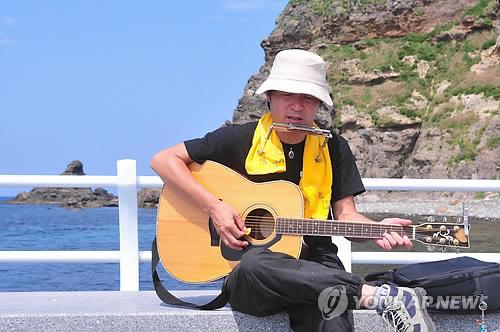"Blinded, cruel days. Bloodstained, lacerated
skirt, and my body. Forgive your vice but remember, A bobbed-hair girl
sits."
Kim Hyun-sung, a well-known local singer-songwriter, premiered a song dedicated to Korean victims of Japan's wartime sexual enslavement last Wednesday when former sex slaves and some 2,000 of their supporters gathered in front of the Japanese Embassy in Seoul for a weekly protest, demanding an apology and compensation from Tokyo for its atrocities.
The issue of elderly Korean women forced into sexual slavery for Japanese troops during World War II, when Korea was under Japan's colonial rule, has been a long-running grievance between the neighboring countries. The victims are euphemistically called "comfort women."
The song is titled "Peace Monument," which is also the name of a statue of a young girl in a traditional Korean dress, sitting on a chair next to another empty chair. It was set up last December in front of the Japanese Embassy by the former sex slaves and their supporters to mark the 1,000th weekly "Wednesday Demonstration."
"After the 'stake terror' incident, I learned that no songs exist about the girl statue, and decided to record a song to prevent people from seeing the weekly demonstration as the usual simple stuff," Kim told Yonhap News Agency on Wednesday, referring to an incident in which a right-wing Japanese activist placed a wooden stake with provocative writing beside the statue in June.
The 54-year-old singer said he became particularly interested in the comfort women issue after visiting South Korea's easternmost islets of Dokdo in 2008 and 2009.
The sexual enslavement and Dokdo issues are major huddles in Seoul-Tokyo relations, which have chilled extensively in recent weeks after South Korean President Lee Myung-bak made a surprise visit to the rocky outcroppings and pressed Japan to resolve the comfort women issue.
Kim stressed the needs to arouse constant public interest in the issues, which have motivated him to write songs and perform during relevant demonstrations since the 1990s.
"The sex slavery (issue) is shared by Northeast Asia, as there are many wartime victims in other Asian countries," he said. "It is also an issue of common interest in the history of man beyond ideology."
Historians say tens of thousands of Asian women, mostly Koreans, were forced to work at front-line brothels for Japanese soldiers during the war.
Kim said he plans to release a record with more new songs about the historic issues, while guarding against dealing with them as emotionally or as an one-time event.
"The historic issues are very serious, long-running matters to us, and we have to deal with them accordingly. I, myself, will pay extra care, while proactively participating in diverse events for the victims in the future."
Yonhap News
Kim Hyun-sung, a well-known local singer-songwriter, premiered a song dedicated to Korean victims of Japan's wartime sexual enslavement last Wednesday when former sex slaves and some 2,000 of their supporters gathered in front of the Japanese Embassy in Seoul for a weekly protest, demanding an apology and compensation from Tokyo for its atrocities.
The issue of elderly Korean women forced into sexual slavery for Japanese troops during World War II, when Korea was under Japan's colonial rule, has been a long-running grievance between the neighboring countries. The victims are euphemistically called "comfort women."
The song is titled "Peace Monument," which is also the name of a statue of a young girl in a traditional Korean dress, sitting on a chair next to another empty chair. It was set up last December in front of the Japanese Embassy by the former sex slaves and their supporters to mark the 1,000th weekly "Wednesday Demonstration."
"After the 'stake terror' incident, I learned that no songs exist about the girl statue, and decided to record a song to prevent people from seeing the weekly demonstration as the usual simple stuff," Kim told Yonhap News Agency on Wednesday, referring to an incident in which a right-wing Japanese activist placed a wooden stake with provocative writing beside the statue in June.
 |
The 54-year-old singer said he became particularly interested in the comfort women issue after visiting South Korea's easternmost islets of Dokdo in 2008 and 2009.
The sexual enslavement and Dokdo issues are major huddles in Seoul-Tokyo relations, which have chilled extensively in recent weeks after South Korean President Lee Myung-bak made a surprise visit to the rocky outcroppings and pressed Japan to resolve the comfort women issue.
Kim stressed the needs to arouse constant public interest in the issues, which have motivated him to write songs and perform during relevant demonstrations since the 1990s.
"The sex slavery (issue) is shared by Northeast Asia, as there are many wartime victims in other Asian countries," he said. "It is also an issue of common interest in the history of man beyond ideology."
Historians say tens of thousands of Asian women, mostly Koreans, were forced to work at front-line brothels for Japanese soldiers during the war.
Kim said he plans to release a record with more new songs about the historic issues, while guarding against dealing with them as emotionally or as an one-time event.
"The historic issues are very serious, long-running matters to us, and we have to deal with them accordingly. I, myself, will pay extra care, while proactively participating in diverse events for the victims in the future."
Yonhap News

No comments:
Post a Comment